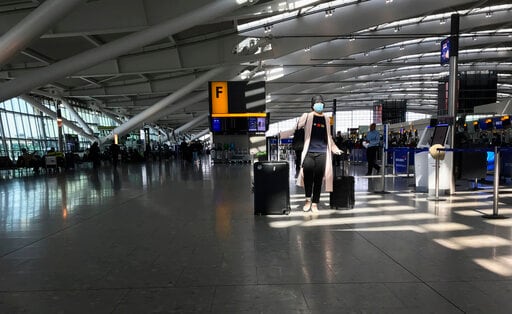

FILE – In this Tuesday, March 24, 2020 file photo, a woman wears a mask as she walks through London’s Heathrow Airport Terminal 5, which is quieter than usual. Air traffic is down 92% this year as travelers worry about contracting COVID-19 and government travel bans and quarantine rules make planning difficult. One thing airlines think could help is rapid virus testing of all passengers before departure. (AP Photo / Kirsty Wigglesworth, file)
The government on Thursday issued a revised set of guidelines for international travelers seeking exemption from institutional quarantine.
- PTI
- Last update: November 5, 2020 8:13 PM IST
- FOLLOW US:
The government issued a revised set of guidelines for international arrivals on Thursday, under which travelers seeking exemption from institutional quarantine must submit a negative RT-PCR report 72 hours before embarking on the journey. Passengers bound for India can also be tested for COVID-19 at airports where the provisions are available.
According to the guidelines issued by the Ministry of Health, passengers would have to make a commitment on the portal or with the Ministry of Civil Aviation through the interested airlines before they are allowed to undertake the trip, indicating that they will abide by the decision. of the corresponding one. government authority to undergo home / facility / self-health quarantine for 14 days, or as warranted.
“Only for compelling reasons / cases of human distress such as pregnancy, death in the family, serious illness and parents with children 10 years or younger, can home quarantine be allowed for 14 days,” he said. To apply for the exemption, they would have to submit an application on the online portal at least 72 hours before boarding the flight to India. The decision made by the government as communicated on the online portal will be final, he said.
“Travelers can also request exemption from institutional quarantine by submitting a negative RT-PCR test report. This test should have been performed within 72 hours prior to embarking on the trip. The test report must be uploaded to the portal for your consideration, “the guidelines stated. . The guidelines established that international passengers who arrive without a negative RT-PCR certificate and wish to apply for exemption from institutional quarantine can also take advantage of the facility to undergo tests at airports where such provisions exist. “International passengers arriving without a negative RT-PCR certificate and who do not opt for the RT-PCR test at the airport (if the facility is available) / arriving at an airport where the testing facility is not available will need to undergo a mandatory institutional quarantine of 7 days and 7 days home quarantine, “it said.
“Passengers who have been exempted from institutional quarantine will show the same on the respective state meters on their cell phones / otherwise before they are allowed home quarantine for 14 days,” he said. The remaining passengers will be taken to appropriate institutional quarantine facilities, which will be arranged by the respective state / UT governments to undergo a mandatory seven-day institutional quarantine and a seven-day home quarantine, he said.
These passengers will be kept in institutional quarantine for a minimum period of seven days, according to the guidelines. They will be tested according to the ICMR protocol. If assessed as asymptomatic / presymptomatic / very mild cases, they will be allowed home isolation or in a Covid Care Center (both in public and private facilities) as appropriate, he said, adding that those with mild / moderate / severe cases Symptoms will be admitted to specific Covid Health facilities and managed accordingly. International passengers arriving through sea / land ports will also need to undergo the same protocol as above, except that the online check-in facility is not currently available to such passengers, per the guidelines.
“Such passengers will have to submit the self-declaration form to the competent authorities of the Government of India at sea / land ports upon arrival. If they find negative, they will be advised to self-monitor their health for an additional 7 days,” he said. Interested airlines / agencies will provide travelers with dos and don’ts along with the ticket, and all passengers will be advised to download the Aarogya Setu app on their mobile devices at the time of boarding the flight.
Only asymptomatic travelers will be able to board flights after thermal inspection. Appropriate precautionary measures, such as environmental sanitation and disinfection, will be ensured at airports, the guidelines said. These revised guidelines supersede those published on the subject on August 2.
.